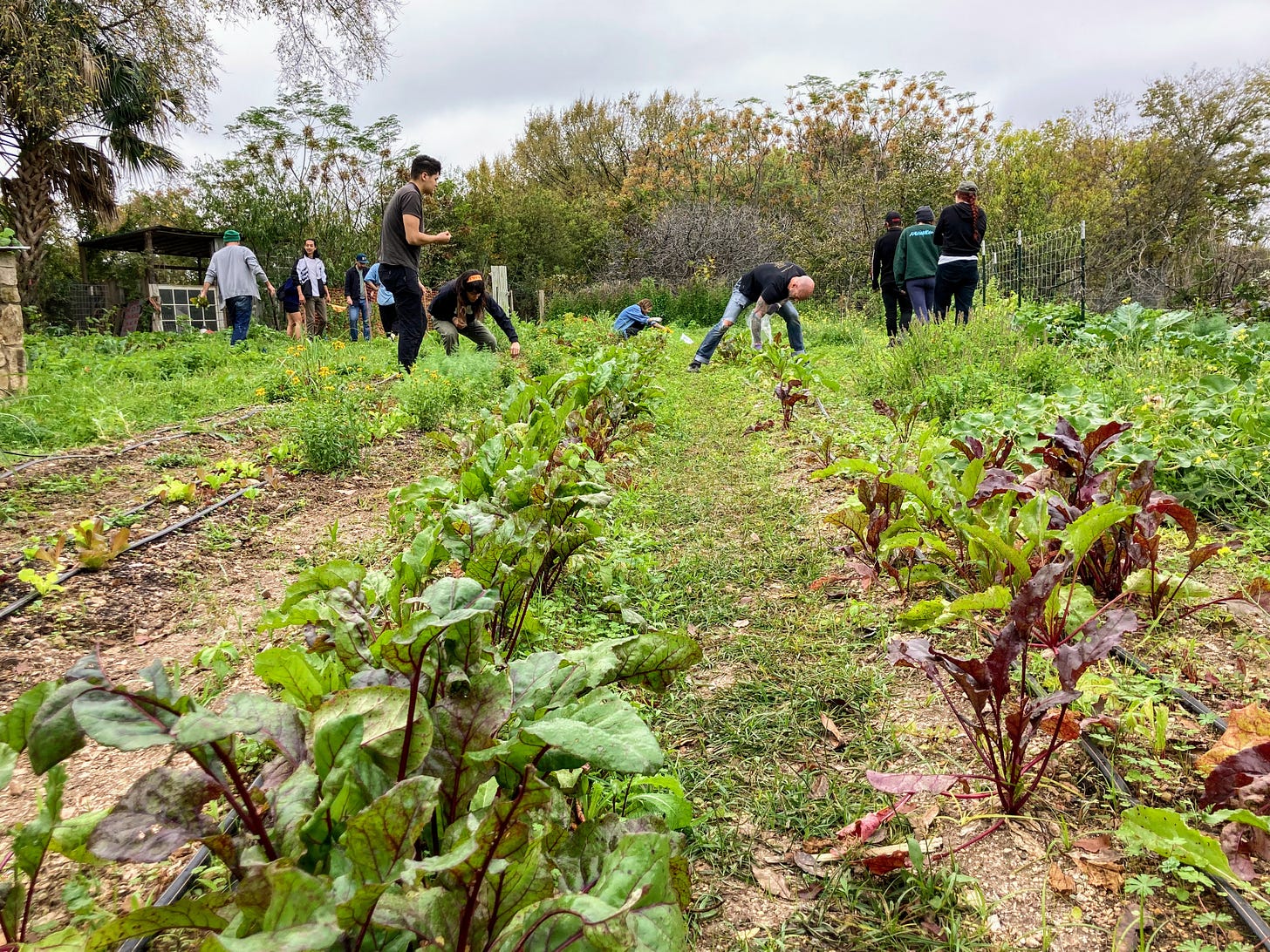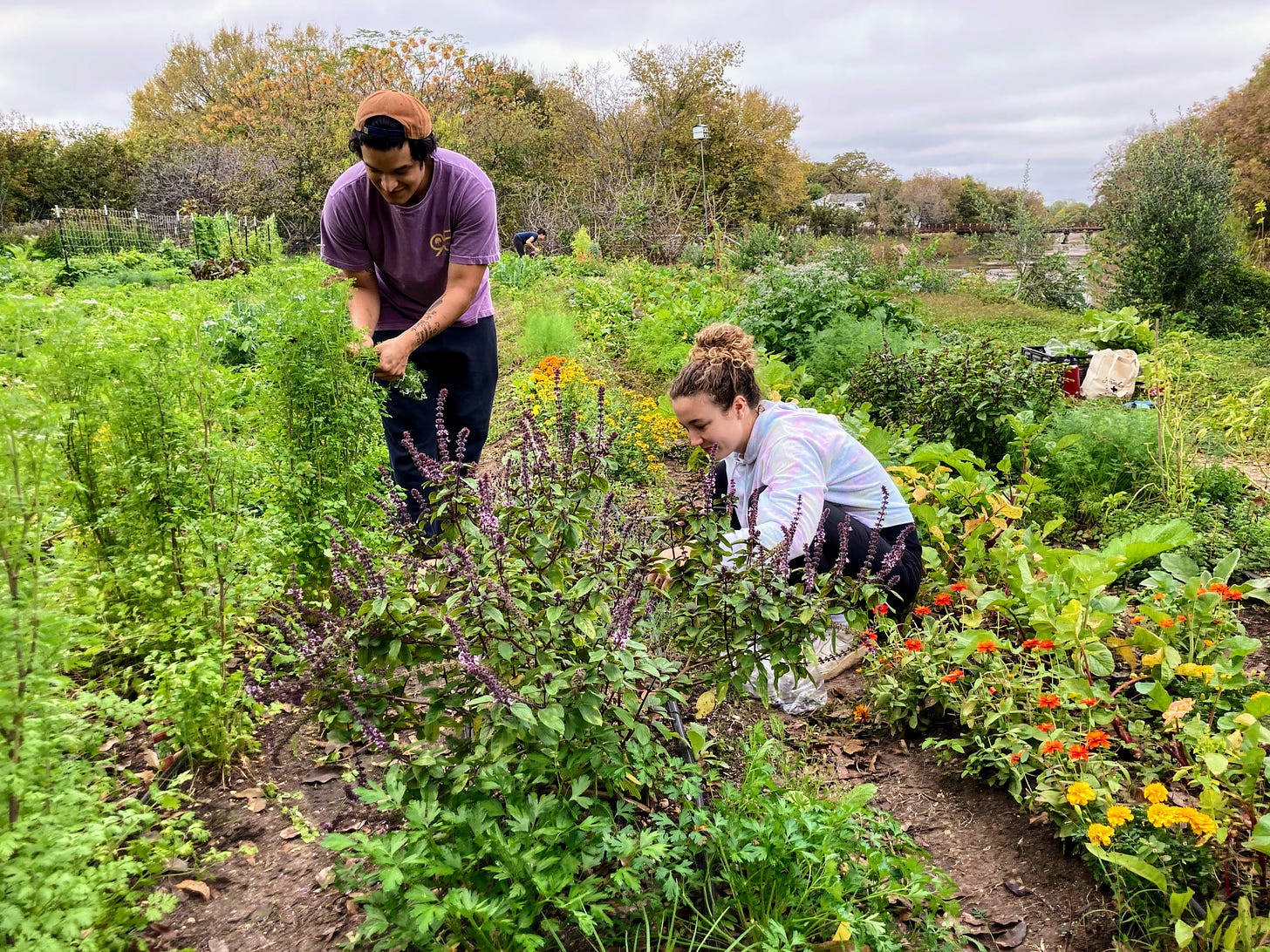'It's like painting with your food'
Farm School for Chefs brings hospitality workers together around seeds, soil and sustainability — for themselves and their restaurants
Hello, readers! Welcome to the latest edition of The Feminist Kitchen, where I’m sharing a story about Farm School for Chefs, a local food education program that teaches chefs and hospitality workers about growing food for their restaurants.
It’s a community-building and wellness effort from Urban American Farmer founder Trisha Sutton, whom I know through the Comedor Run Club world. (We first met when I wrote a column about her heirloom seed project that she started in 2019.)
One day last fall, I checked out one of her classes at Rain Lily Farm, where the Farm School takes place. Many of the restaurants who participated last fall are back for the spring semester, which starts on March 1. (Feel like getting your hands dirty? Sutton is hosting volunteer work days from 9 a.m. to 2 p.m. on Feb. 27 and 28 to help get the beds ready for the new semester.)
And one programming note, ICYMI last week: Now that posts on The Feminist Kitchen become free after a year, here’s the piece I wrote last year after the freeze that killed hundreds and left thousands without power and water for days:
Thanks for reading! Indie journalism is just one part of a healthy media landscape, and it couldn’t happen without subscribers like you. So, thank you for pitching in with a paid subscription if you can and by sharing this newsletter with your friends. It all helps!
One Monday last November, Ash Villanueva, who had just started working at Comedor, spent one of her first days off picking marigolds.
The line cook crouched beside a long garden bed filled with dozens of herbs, leafy greens and edible flowers, that would later be served at the downtown restaurant where she’d recently landed a job.
“It’s been a 180 these past two weeks,” she says. “I’m being taught so much. (Cooking) is more than just using the same three things. At Comedor, it’s like you’re painting a picture with your food.”
Villanueva had learned about farm-to-table cooking at Escoffier School of Culinary Arts before working her first culinary job at a food trailer, but she didn’t get to experience farm-to-table cooking until signing on at Comedor, which is one of about a dozen restaurants that participated in Farm School for Chefs, a new farming program in East Austin that offers hands-on garden education developed specifically for hospitality workers in mind.

The project is the latest effort from Trisha Sutton, a co-founder of last year’s Field Guide Festival who runs a garden installation and education company called Urban American Farmer. She started the farm school last year as an experiment in community building and group learning.
Sutton is an active member of the Comedor Run Club, a running club her partner Philip Speer started in 2019 as a way to encourage wellness practices in the restaurant industry.
She thought: What if restaurant employees could have access to garden beds to help foster better workplace culture while learning to grow their own food?
She knew the idea would work, but she needed a space. Rain Lily Farm in East Austin, where Farmhouse Delivery launched more than a decade ago, had slowed production after Farmhouse moved its headquarters to another property, so Sutton made a deal to take over management of the fields and turn it into an outdoor classroom.

Enrollment is open to people who work in the service and hospitality industry, Sutton says, particularly restaurants that want to offer their employees a way to stay engaged with each other or to deepen their own interest in plants and agriculture.
Sutton grew up farming and has spent years honing the art of growing food in an urban environment, including seed saving, but the classes she hosts at the Farm School cover food and farming topics through the lens of a hospitality professional.
The lesson on this day was seasonality: How can chefs serve foods that are in season while also meeting diners’ expectations of variety and familiarity?
“Nature works to provide us what we need when we need it,” Sutton tells the group of about 20 hospitality industry workers sitting on benches underneath the roof of an outdoor shed.
“We think we are the ones in control, but we can’t get every crop all year long,” she says, but customers have to understand that this isn’t a bad thing. Tasting brassicas or strawberries that are grown locally and seasonally can be a transformative experience, so encourage them to try what’s in season before deciding that they don’t like it.
Seasonality has unexpected benefits, one student chimes in. It’s Fiore Tedesco, the co-owner of the Mueller standout restaurant L’Oca D’Oro, who has been sourcing locally for nearly a decade.
“Guests are asking for food that makes them feel a certain way,” he says. “I appreciate it when they tell me they have their preferences,” which can help me offer alternative suggestions based on what’s in season. This can turn into a conversation about where the guest comes from and where they live now.
Sutton responds: “Cooking seasonally forces you to be creative and to learn about the context of where you live.”
It’s supposed to change from month to month, or even week to week. That’s how people ate before the globalized food system created the expectation that ingredients should be available (and taste the same) all year around.
Speer chimes in: “I love cooking like this because it makes me think about what food looked like when we didn’t have it coming from everywhere.”
It takes a while to unlearn the habits of buying produce and meat from across the world, Sutton says, but transitioning to seasonal cooking will lead to changes in how your guests interact with your menu.
“You want your guests to crave your food,” she says. “You want them to be so excited to try what you have when you are so in sync with the seasons.”

After the discussion part of the class ended, the students spent the next few hours in the fields.
That’s where I caught up with James Robert, executive chef at Fixe and another Comedor Run Club regular, who had never had a garden before digging into his restaurant’s two rows last fall.
“I came in with a blank slate,” Robert says, “so I was learning everything from planting the seeds and then watching them germinate and coming up. It's just been fascinating to me. And a lot of work. It's like it gives you such a great respect for farmers and what they do.”
His restaurant grew vegetables that took a long time to grow, including beets that he later pickled and roasted and topped with dehydrated Kalamata olives for a special dish at the restaurant.
But next semester, he says they plan to change course and grow things that could be clipped and grow back for multiple harvests. “I've also learned that weeds are relentless.”
The best thing about Farm School, however, he says, has been meeting gardeners from other restaurants, including Intero and L’Oca D’Oro.
The Emmer & Rye restaurant group, which operates restaurants including Kalimoxto and Hestia, partners with Trosi Farm, a 10-acre farm outside Austin, whose farmers grow produce for the restaurants, but employees like Jose Vega, who is a line cook at Emmer & Rye, get something else when they come to Farm School.
“We, as chefs, work a lot. We’re nerds. We talk about this stuff all the time,” he says.
Being outside and working with plants and the soil gives them a chance to get to know one another and learn more about their lives — and themselves — outside the kitchen.
Sutton says there are still a couple of open rows for the semester that starts next week. If you know of a restaurant that might enjoy this experience, you can find her at instagram.com/urbanamericanfarmer.







What a fascinating article. I had no idea this existed in Austin, what a great way to educate and feed the community all at the same time. Thanks for letting your readers know about this.